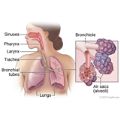Our Health Library information does not replace the advice of a doctor. Please be advised that this information is made available to assist our patients to learn more about their health. Our providers may not see and/or treat all topics found herein.
Topic Contents
Middle East Respiratory Syndrome (MERS)
Condition Basics
What is Middle East respiratory syndrome (MERS)?
Middle East respiratory syndrome (MERS) is an illness that was first found in Saudi Arabia in 2012 and has since spread to other countries. It's caused by a type of coronavirus that can cause a moderate to severe upper respiratory illness such as the common cold. MERS can sometimes cause more serious lung problems like pneumonia.
Experts believe MERS may have first developed in animals, because the virus has been found in camels and bats. Some people have become ill with MERS after being around infected camels.
How is it spread?
Like most respiratory illnesses, Middle East respiratory syndrome (MERS) is spread mainly through contact with infected saliva or droplets from coughing. In general, you need to have close contact to become infected. Close contact includes living with or caring for a person who has MERS or breathing in air that an infected person breathed out.
Older adults and people who have a long-term health condition, such as lung disease, are most at risk for getting MERS and for having a severe case.
What are the symptoms?
The main symptoms of Middle East respiratory syndrome (MERS) are a fever, a dry cough, shortness of breath, or trouble breathing. MERS may also cause a headache, muscle aches, a sore throat, fatigue, and diarrhea. For some people the symptoms get worse quickly, so they may need to stay in the hospital.
The incubation period-the time from when a person is first exposed to MERS until symptoms appear-is usually 5 to 6 days, but it may be as long as 14 days.
How is it diagnosed?
Your doctor may suspect Middle East respiratory syndrome (MERS) if you have a fever and you either have traveled to a MERS-affected area or have in the past 14 days been around a person who has MERS.
Your doctor may order several tests to find out the cause of your symptoms. A blood sample, saliva sample, or nasal swab may be used to look for bacteria or viruses.
How is Middle East respiratory syndrome (MERS) treated?
Severe cases of Middle East respiratory syndrome (MERS) often require a hospital stay, especially if breathing problems develop. You will be placed in isolation to prevent passing the disease to others.
Treatment will focus on relieving symptoms, and it may include medicines and treatments to make it easier to breathe.
MERS can be very serious. The risk of dying from the illness depends on a person's age and health. The greatest risk is to people who are older than 65 and those who have chronic illnesses, such as diabetes or heart disease.
How can you help prevent it?
The best way to prevent getting or spreading Middle East respiratory syndrome (MERS) is to:
- Avoid areas where there is an outbreak.
- Avoid contact with sick animals.
- Avoid contact with people who may be infected.
- Wash your hands often with soap or alcohol hand cleaners.
- Cover your mouth when you cough or sneeze.
Where can you find the latest information?
The following health organizations are tracking and studying Middle East respiratory syndrome (MERS). Their websites contain the most up-to-date information, including advice for travelers.
- World Health Organization (WHO): WHO offers information about the status of the disease around the world, including summaries of research meetings and articles about the MERS outbreaks. WHO also issues travel recommendations. Find more information at http://www.who.int/csr/disease/coronavirus_infections/en.
- U.S. Centers for Disease Control and Prevention (CDC): The CDC provides information about the cause of the disease, diagnostic tests, possible treatments, and travel alerts and advisories for affected areas. The website also contains recommendations to prevent the spread of infection. You can find information at http://www.cdc.gov/coronavirus/mers/about/index.html.
- Health Canada: Health Canada offers information on the government's response to MERS, clinical guidelines, public health and infection control recommendations, and information for travelers. Find more information at https://www.canada.ca/en/public-health/services/diseases/middle-east-respiratory-syndrome-mers.html.
Related Information
Credits
Current as of: April 30, 2024
Author: Ignite Healthwise, LLC Staff
Clinical Review Board
All Healthwise education is reviewed by a team that includes physicians, nurses, advanced practitioners, registered dieticians, and other healthcare professionals.
Current as of: April 30, 2024
Author: Ignite Healthwise, LLC Staff
Clinical Review Board
All Healthwise education is reviewed by a team that includes physicians, nurses, advanced practitioners, registered dieticians, and other healthcare professionals.
This information does not replace the advice of a doctor. Ignite Healthwise, LLC disclaims any warranty or liability for your use of this information. Your use of this information means that you agree to the Terms of Use and Privacy Policy. Learn how we develop our content.
To learn more about Ignite Healthwise, LLC, visit webmdignite.com.
© 2024-2025 Ignite Healthwise, LLC.




